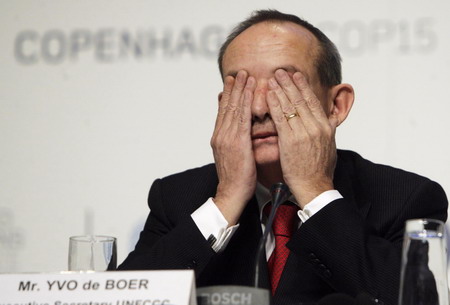Asia-Pacific
UN climate talks end with bare minimum agreement
(Agencies)
Updated: 2009-12-20 10:07
 |
Large Medium Small |
|
|
COPENHAGEN: UN climate talks ended with a bare-minimum agreement on Saturday when delegates "noted" an accord struck by the United States, China and other emerging powers that falls far short of the conference's original goals.
"Finally we sealed a deal," UN Secretary-General Ban Ki-moon said. "The 'Copenhagen Accord' may not be everything everyone had hoped for, but this ... is an important beginning."
It set a target of limiting global warming to a maximum 2 degrees Celsius over pre-industrial times -- seen as a threshold for dangerous changes such as more floods, droughts, mudslides, sandstorms and rising seas. But it failed to say how this would be achieved.
It held out the prospect of $100 billion in annual aid from 2020 for developing nations but did not specify precisely where this money would come from. And it pushed decisions on core issues such as emissions cuts into the future.
"This basically is a letter of intent ... the ingredients of an architecture that can respond to the long-term challenge of climate change, but not in precise legal terms. That means we have a lot of work to do on the long road to Mexico," said Yvo de Boer, head of the UN Climate Change Secretariat.
Another round of climate talks is scheduled for November 2010 in Mexico. Negotiators are hoping to nail down then what they failed to achieve in Copenhagen -- a new treaty to replace the Kyoto Protocol. But there are no guarantees.
Non-binding Accord
A plenary session of the marathon 193-nation talks in the Danish capital merely "took note" of the new accord, a non-binding deal for combating global warming finalised by US President Barack Obama, China, India, Brazil and South Africa.
Work on the pact had begun in a meeting of 28 leaders, ministers and officials, including EU countries and small island nations most vulnerable to climate change.
The European Union, which has set itself ambitious emissions cuts targets and encouraged others to follow suit, only reluctantly accepted the weak deal that finally emerged.
"The decision has been very difficult for me. We have done one step, we have hoped for several more," said German Chancellor Angela Merkel.
In the final hours of the talks, which began on Dec. 7 and ended early on Saturday afternoon, delegates agreed to set a deadline to conclude a UN treaty by the end of 2010.
At stake was a deal to fight global warming and promote a cleaner world economy less dependent on fossil fuels.
The accord explicitly recognised a "scientific view" that the world should limit warming to no more than 2 degrees Celsius -- although the promised emissions cuts were far short of the amount needed to reach that goal.
"We have a big job ahead to avoid climate change through effective emissions reduction targets, and this was not done here," said Brazil's climate change ambassador, Sergio Serra.













